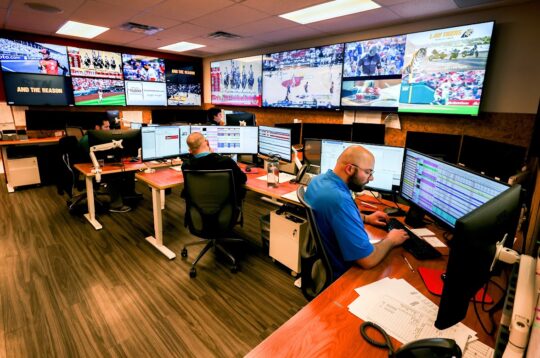
Nevada, the birthplace of legal sports betting in the United States, is on the brink of a new era of growth for its sports betting industry. Following a series of recent legal changes and expanding market opportunities, the state is well-positioned to further solidify its dominance in the rapidly evolving sports betting landscape.
Legal Changes Fueling Expansion
In the past few years, Nevada has introduced several key legal changes that are helping to reshape its sports betting market. These changes include adjustments to the state’s regulations, expansion of betting options, and increased integration of mobile and online platforms. As a result, Nevada’s sports betting industry is expected to experience significant growth, with new opportunities for both operators and consumers.
- Mobile Sports Betting Legalization: While Nevada has long allowed in-person sports betting, the state has recently expanded its laws to fully embrace mobile and online sports betting. This move follows the success of mobile sports betting in states like New Jersey, which has seen tremendous growth in its mobile sports betting handle. Nevada’s legalization of remote registration and online sports betting gives residents and visitors more convenient access to betting platforms.
- Changes to College Sports Betting: Another important legal shift involves the loosening of restrictions on betting on college sports. Nevada had been one of the few states with stringent limitations on college sports betting, particularly prohibiting bets on in-state college teams. With the recent changes, sports bettors in Nevada now have more flexibility in placing wagers on college games, attracting a wider range of bettors.
- Enhanced Sportsbook Operations: Nevada’s sportsbooks have also adapted to these changes, enhancing their offerings with more diverse betting options and advanced technologies. From live in-game betting to prop bets and multi-sport parlays, the sportsbooks are attracting a new generation of bettors eager for dynamic betting experiences.
Impact on the State’s Economy
The legalization of mobile and online sports betting, along with expanded options for college sports, promises to significantly boost Nevada’s economy. Nevada’s gaming industry, which has traditionally been a cornerstone of its economy, stands to gain even more revenue from the influx of bettors now able to wager remotely and more easily on a wide array of sports.
- Increased Revenue Streams: The expansion of legal sports betting allows Nevada to tap into the previously underserved market of online bettors. As more people turn to their phones and computers to place bets, Nevada will see a rise in both tax revenues and operator profits. This could provide a vital boost to the state’s budget and the wider economy, particularly in a post-pandemic recovery period.
- Job Creation: As the sports betting industry expands, Nevada is expected to see job growth in several areas. From sportsbook operations to mobile platform development, the legal changes will create new employment opportunities in technology, customer service, and management. This influx of job opportunities will help support the state’s economy in a variety of sectors.
Growing Competition from Other States
While Nevada’s sports betting industry is poised for significant growth, it is not without competition. Other states, including New Jersey, Pennsylvania, and Michigan, have rapidly developed their sports betting markets, and their growth continues to put pressure on Nevada to remain at the forefront. However, Nevada still holds a key advantage in being the first state to establish legal sports betting, and its legacy in the gambling industry gives it a unique edge in attracting both bettors and operators.
- Technological Innovation: Nevada has a long history of technological innovation in the gaming industry, and the state’s sportsbooks are already leveraging the latest advancements in mobile apps, live streaming, and data analytics to enhance their offerings. This continued focus on technology will help Nevada maintain its competitive advantage over newer sports betting markets.
- Tourism Appeal: Nevada also benefits from its status as a premier tourism destination. The combination of vibrant cities like Las Vegas and Reno, coupled with major sporting events such as the NFL’s Las Vegas Raiders games, the NHL’s Vegas Golden Knights, and large-scale boxing and UFC matches, ensures a steady stream of visitors who are eager to place sports bets in person or through mobile apps.
The Future of Sports Betting in Nevada
Looking ahead, Nevada’s sports betting industry is set to expand even further. The state is likely to see more sportsbooks open and more betting options become available as legal changes continue to unlock new possibilities. Sportsbooks will continue to innovate by offering a wider range of betting markets and improved user experiences.
- Integration of New Sports and Markets: As sports betting becomes more mainstream, Nevada sportsbooks will likely expand beyond traditional betting markets, offering more niche options for eSports, virtual sports, and international competitions. This will cater to a broader audience and attract more bettors.
- Increased Focus on Responsible Gambling: As the industry grows, so too will the need for responsible gambling measures. Nevada’s regulators and operators are expected to implement more comprehensive programs to protect players and ensure that gambling remains safe and fair for all.
Conclusion
Nevada’s sports betting industry is on the cusp of a major growth spurt, fueled by recent legal changes that expand mobile betting and broaden betting options, particularly around college sports. As the state capitalizes on these changes, it is poised to become an even bigger player in the U.S. sports betting market. With its established infrastructure, technological innovation, and vibrant tourism industry, Nevada is well-positioned to maintain its dominance, even as new competition emerges from other states. The future of sports betting in Nevada looks bright, and the state’s legacy as a leader in the gaming industry remains intact.
🚀 KKClub.pk: The Best Casino & Slot App for Unmatched Gambling Fun in 2024 🎰
Looking for the best casino app in Pakistan? KKClub.pk is your ultimate destination for online gambling, offering a wide variety of live casino games, slots, and big jackpot wins all on your mobile. Whether you’re a fan of poker, blackjack, or spinning the reels on the latest slot machines, KKClub.pk has everything you need for an unforgettable gambling experience.
Why Choose KKClub.pk for Your Gambling Needs?
- Top Casino Games: Explore our live casino games including roulette, poker, blackjack, and baccarat. Experience the thrill of real-time casino action wherever you are!
- Massive Slots Collection: Dive into a wide range of slots with incredible themes, exciting bonus features, and huge payout opportunities. Whether you’re looking for classic slots or modern video slots, we’ve got you covered!
- High Payouts & Jackpots: At KKClub.pk, we feature some of the highest payout slots, giving you a greater chance to hit life-changing jackpots with every spin.
- Safe and Secure: Enjoy safe gambling with fast payouts and a secure gaming environment. Your privacy and security are our top priority, with 100% secure payment methods.
Exclusive Bonuses & Promotions at KKClub.pk
- Claim Your Welcome Bonus: New players can take advantage of our exclusive welcome bonuses when they sign up today. Get free spins, deposit bonuses, and more to boost your chances of winning.
- Ongoing Promotions: Don’t miss out on special promotions and loyalty rewards. The more you play, the more you win!
How to Get Started with KKClub.pk
- Download the KKClub.pk App: Available for both Android and iOS, get the app and start playing today.
- Sign Up & Get Your Bonus: Create your account and receive an instant welcome bonus to kickstart your journey with us.
- Start Playing & Win Big: Whether you prefer slots or casino games, we offer endless ways to win with the best payout rates in the industry.
Why KKClub.pk is the Best Online Casino App
- 24/7 Support: Our customer support team is here to assist you whenever you need help, ensuring you have a smooth experience every time you play.
- Mobile-Friendly: Play from anywhere, anytime, with our optimized mobile app for both Android and iOS. Just download it now and take your favorite games with you on the go.
🌟 Join KKClub.pk today and experience the best online casino and slots app in Pakistan! 🌟



